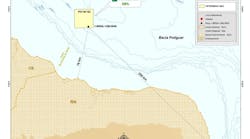When President Bush signs the omnibus energy bill, he will enact a broad law to enhance production of renewable fuels, electricity, nuclear power, coal, and alternative fuels.
The bill gives independent producers relief from the alternative minimum tax effective Jan. 1.
There's nothing major in the bill for larger oil firms because legislators deleted chapters that would have allowed leasing of the Arctic National Wildlife Refuge and promoted natural gas production and transportation.
But scattered through the bill are a number of worthwhile minor provisions.
FERC, DOE, SPR
To ensure that U.S. gas and Canadian imports are on a level playing field, the bill forbids the Federal Energy Regulatory Commission to treat imported gas "on an unjust, unreasonable, unduly discriminatory, or preferential basis."
The Department of Energy is required to promote technologies to refine or liquefy coal into transportation fuels and facilitate production of coalbed methane.
The president is permitted to draw down the Strategic Petroleum Reserve if there has been a severe increase in the price of U.S. petroleum products. And the bill reaffirms the goal for a 1 billion bbl SPR.
The legislation toughens requirements that service stations post octane or cetane ratings for fuels and gives the states enforcement powers.
It establishes a climate protection office in DOE and requires a national inventory of greenhouse gas emissions.
It give oil pipelines a simplified ratemaking methodology at the Federal Energy Regulatory Commission with less opportunity for tariff challenges.
The bill allows tax credits for clean fuel vehicles and refueling stations, including natural gas, LNG, and LPG.
And it cuts the federal excise tax on 10% alcohol fuels 5.4/gal to 14.7.
The bill gives a few majors a tax credit for unused payments into the trans-Alaska pipeline liability fund. It eliminates the position of federal inspector of the Alaskan Natural Gas Transportation System, a pipeline yet unbuilt.
PRODUCTION, LEASES
The measure says, "If the president finds that declines in production of oil from domestic resources pose a threat to national energy security, he may direct DOE to acquire oil from domestic production of stripper well properties for storage in the SPR" at market prices.
The legislation requires DOE research and development programs to improve production from common types of U.S. oil fields, from eastern and western oil shales, and from conventional gas fields and tight sands or Devonian shales.
DOE is required to establish a Midcontinent Energy Research Center to promote enhanced oil recovery in that area.
The bill sets all federal onshore competitive and noncompetitive leases for 10 year terms. Formerly, competitive leases were for only 5 years and noncompetitive were for 10. In the case of stripper wells (15 b/d or 60 Mcfd) on federal land, it allows competitive leases to be converted into noncompetitive leases.
And it protects farmout interests when one party with a lease interest goes bankrupt.
Copyright 1992 Oil & Gas Journal. All Rights Reserved.

